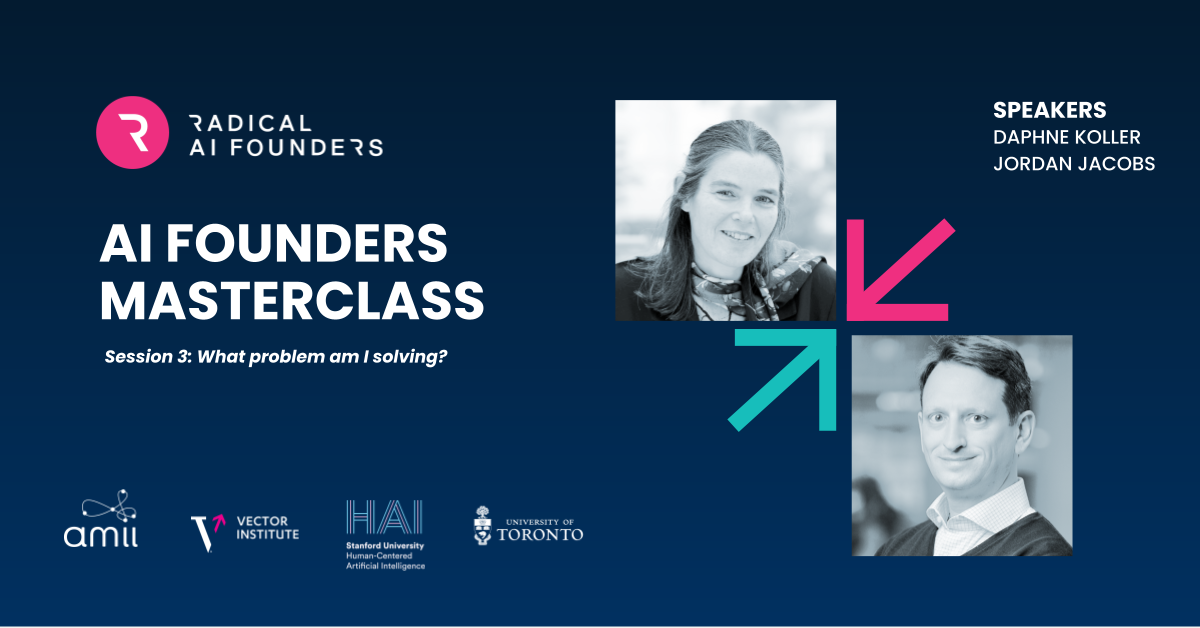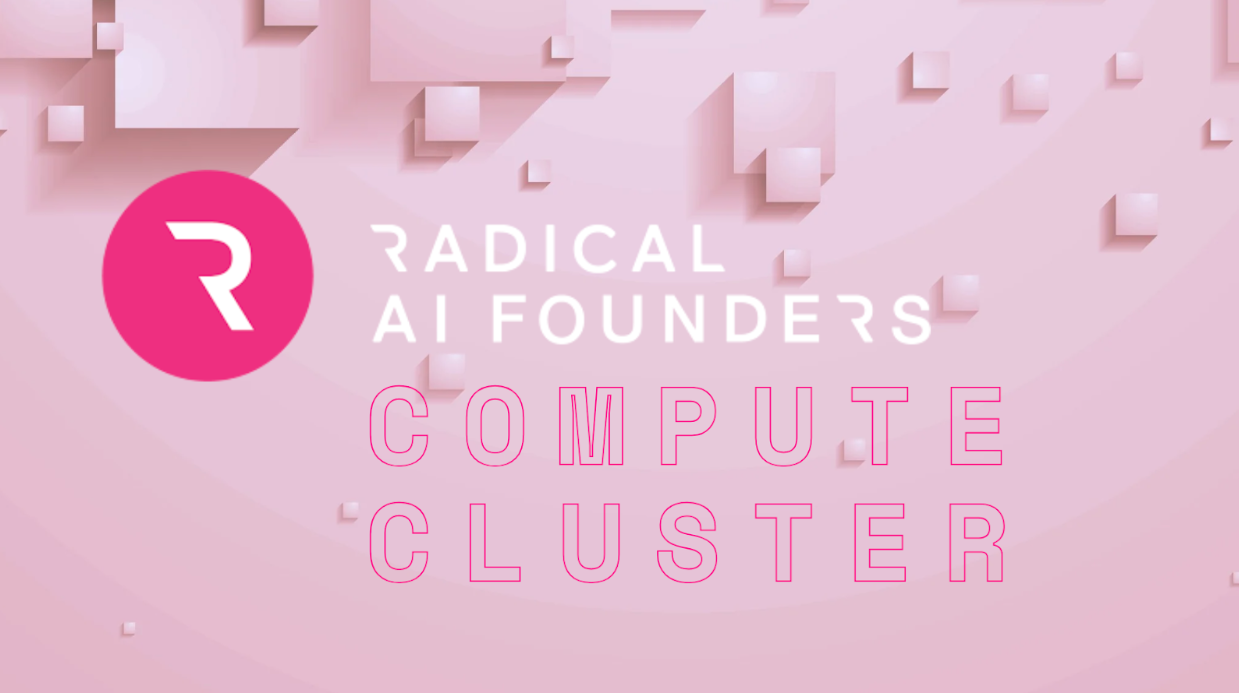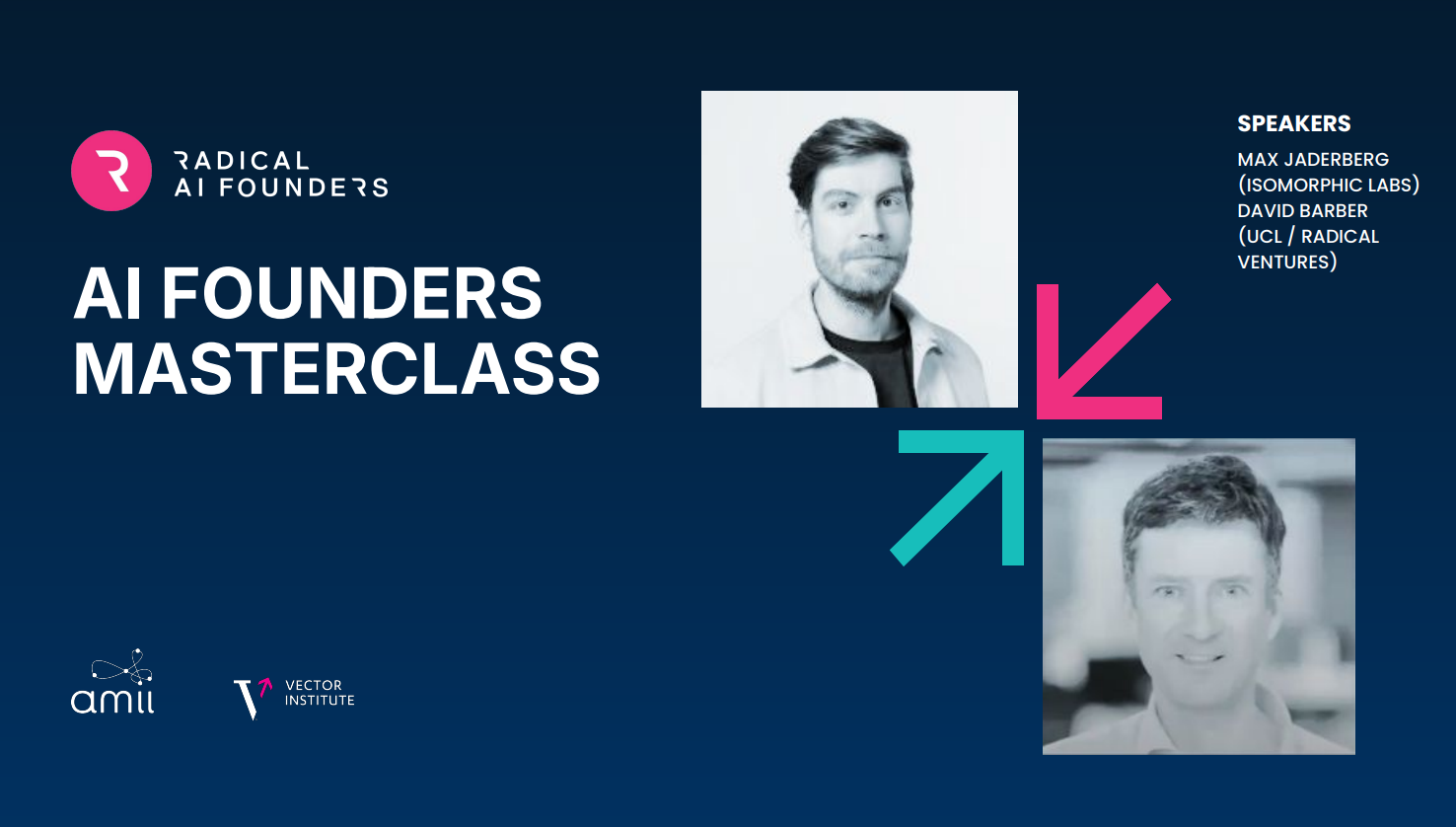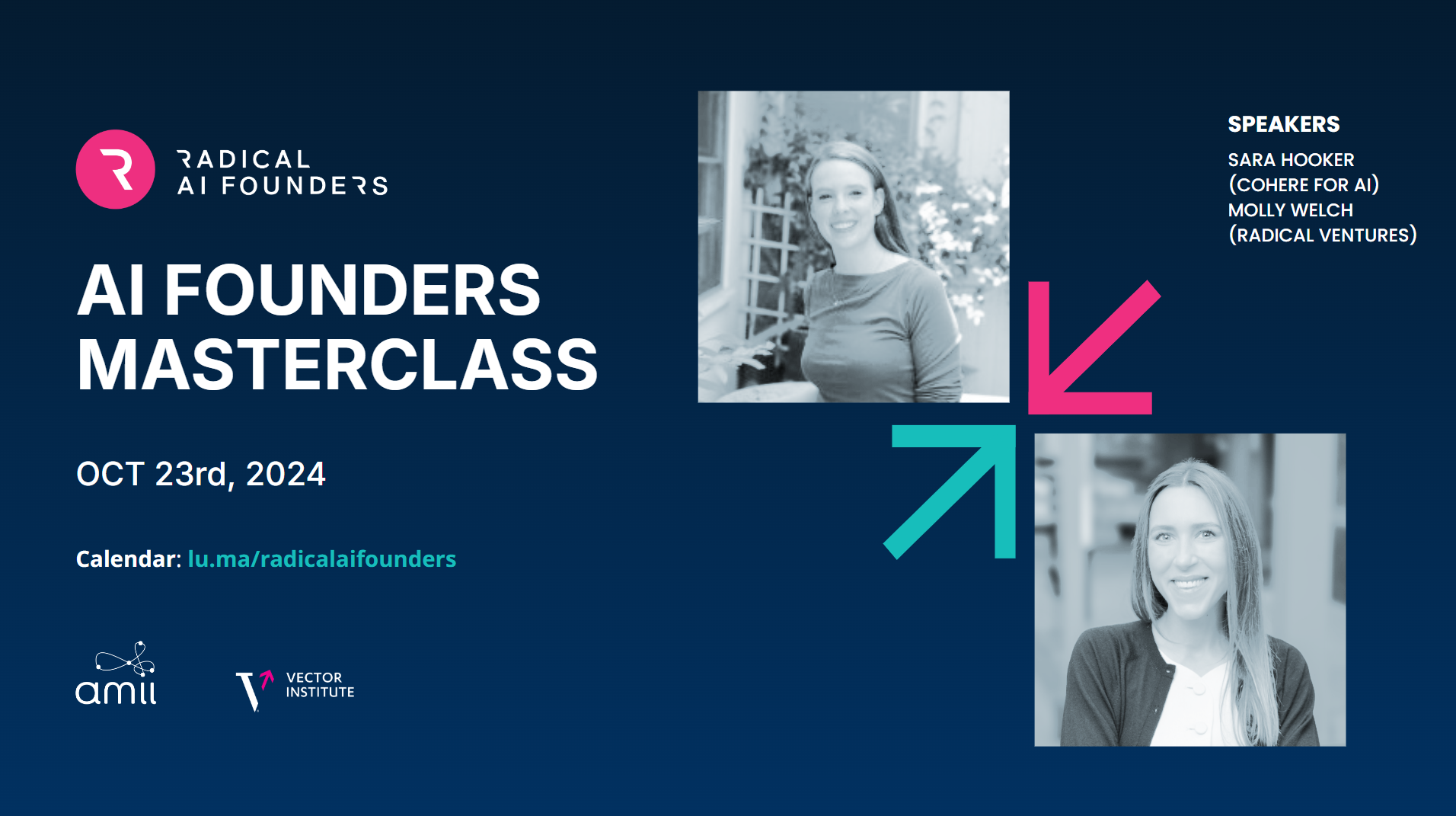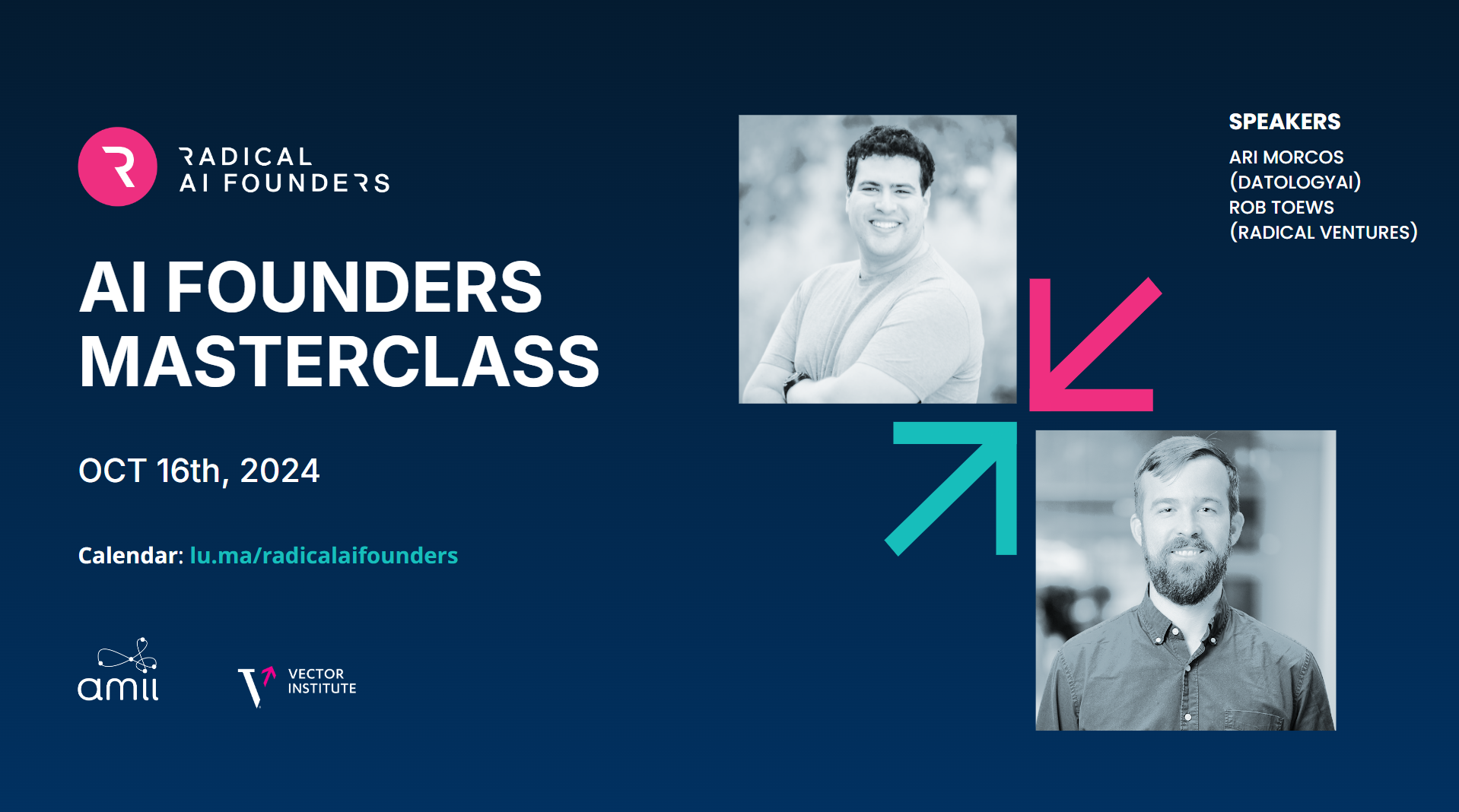The Radical AI Founders Masterclass returned this week with a discussion between Daphne Koller, Founder and CEO of insitro and Co-Founder of Coursera, and Jordan Jacobs, Managing Partner and Co-Founder of Radical Ventures. Their conversation focused on the importance of identifying the right problem to tackle as an AI founder. Please note that the excerpt below has been edited for conciseness and clarity.
Jordan Jacobs: Deciding to move from Coursera to start insitro was a total shift, but one that took you back to your original academic focus. Can you explain your thinking and approach to that decision?
Daphne Koller: Looking at the timeline is really important. I left Stanford in 2011 and the machine learning revolution started happening in 2012. So I missed the beginning. In those first few years at Coursera, we were extremely busy. We were in the news up to 20 times weekly and I was constantly flying around the world. At the time, when people asked me what it was like to be at Coursera I would say, “It’s like being the puppeteer in the movie ‘Being John Malkovich.’” It was a weird experience – interesting – but it didn’t feel like it was my life.
I thought about my north star and where I could make the biggest difference. I asked myself, “Would that be at Coursera, or could someone do it just as well, maybe even better than me?” Alternatively, the machine learning revolution was transforming the world around us, but it really wasn’t having much of an impact on the life sciences. At the time, I was one of the very few individuals who had a deep grounding in both biology and computer science/machine learning. That combination was rare – each discipline is very deep and very broad — and they approach problems from different perspectives. In some ways, they are like magnets that repel each other. I had an opportunity to make a disproportionately large difference to human health by leaving Coursera.
Jordan Jacobs: Early on, you had identified problems within drug discovery that could be addressed with machine learning. There were very few companies at that point that were combining machine learning and drug discovery – which is reflected in the name of the company. Tell us about how you choose which disease areas to focus on and how you’re using machine learning to solve the problem.
Daphne Koller: insitro is the synthesis of in silico which means “in the computer” (silicon) and in vitro which means “in the test tube” (in the lab). The reason why it’s so evocative is that we’re truly bringing together, in a seamless integration, wetlab scientists and computational scientists.
The technology stack drives the selection of the disease areas. Our vision for our company is a therapeutic pipeline that is defined by advances in the technology platform. You might think that this is something that goes without saying – it does not. The number of companies that have built a therapeutic pipeline through a platform approach that actually generates medicine…you can count on one hand and probably have a finger or two left over.
The biggest problem in drug discovery is that we simply go after the wrong targets. Most drugs fail. The big costs in drug discovery are because the vast majority of things that start in clinical development fail. There’s a 90% failure rate. That’s mostly because the biology is complicated and we don’t understand it. Getting the right target is where the real value creation happens. It’s earlier in the process.
The truth is that disease manifests in ways that people just aren’t able to perceive because the data are so rich and complex. The big use for us in machine learning is really understanding phenotypic traits – cells and people – and how disease-causing processes make them go one way or another and to understand what interventions are needed to move them back.
If you are an AI researcher interested in founding an AI-first company, you can sign up for the second half of the Radical AI Founders Masterclass here:
radical.vc/radical-ai-founders
AI News This Week
-
Watch: Investing in AI start-ups shaping the future (BNN)
Jordan Jacobs, Managing Partner and Co-Founder of Radical Ventures, discusses picking winners in AI start-ups at the Capitalize for Kids investors’ conference in Toronto. Jordan touches on the market traction generative AI businesses are seeing across every industry, the attributes Radical looks for in AI companies and the “Game of Thrones” dynamics where demand for high-performance computing chips is outstripping supply.
-
A highly integrated bionic hand with neural control and feedback for use in daily life (Science Robotics)
An experimental prosthetic hand with embedded electrodes is helping a patient regain function and ease phantom pain — connecting directly to her bones, muscles, and nerves. With the help of AI and embedded electrodes, the arm behaves much like a real flesh-and-blood hand. The bionic hand is controlled by the nervous system, provides sensory feedback, and achieves a 95% success rate in precise finger movements.
-
Watch: Israeli civilians are using AI to help identify victims (New York Times)
Brothers and Sisters for Israel formed initially to protest judiciary reform. After Oct. 7, they shifted their mission to helping victims of the attacks, and together with volunteers from Israel’s leading tech companies, created a sophisticated data operation to help find out more about those missing, taken hostage or killed.
-
AI tidies up Wikipedia’s references — and boosts reliability (Nature)
Results from an AI system called SIDE suggest that AI can help clean up inaccurate or incomplete reference lists in Wikipedia entries, improving their quality and reliability. Trained on notable Wikipedia articles, SIDE evaluates the validity of references and suggests superior alternatives. During testing, SIDE’s top choice for a reference was already cited in 50% of articles. For the others, it found alternative references. When assessed by Wikipedia users, 21% preferred the AI-generated citations, 10% favoured the existing citations, and 39% were indifferent. While users may be indifferent about their citations, the tool could save time for editors and moderators who check entries’ accuracy.
-
A taxonomy and review of generalization research in NLP (Nature Machine Intelligence)
Researchers, including Mikel Artetxe of Radical Ventures portfolio company Reka AI, have developed a system to categorize and understand the adaptability of language processing models. Understanding how well these models can generalize (i.e. adapt to new situations) is crucial, but it is not entirely clear how to define “adapting well” or how to measure it. Based on an extensive literature review and tests, the researchers identified five key areas to evaluate a model’s adaptability: motivation, generalization type, shift type, shift source, and shift locus. Their findings highlighted certain gaps in current research: a misalignment between study goals and methods, limited focus on multiple languages and inclusivity, and inconsistencies in methods across similar studies. They also observed that most research only addresses a single aspect of a model’s process. To foster deeper insights and collaboration, the group launched a website with various research tools, aiming to improve future language model testing standards.
Radical Reads is edited by Ebin Tomy.

